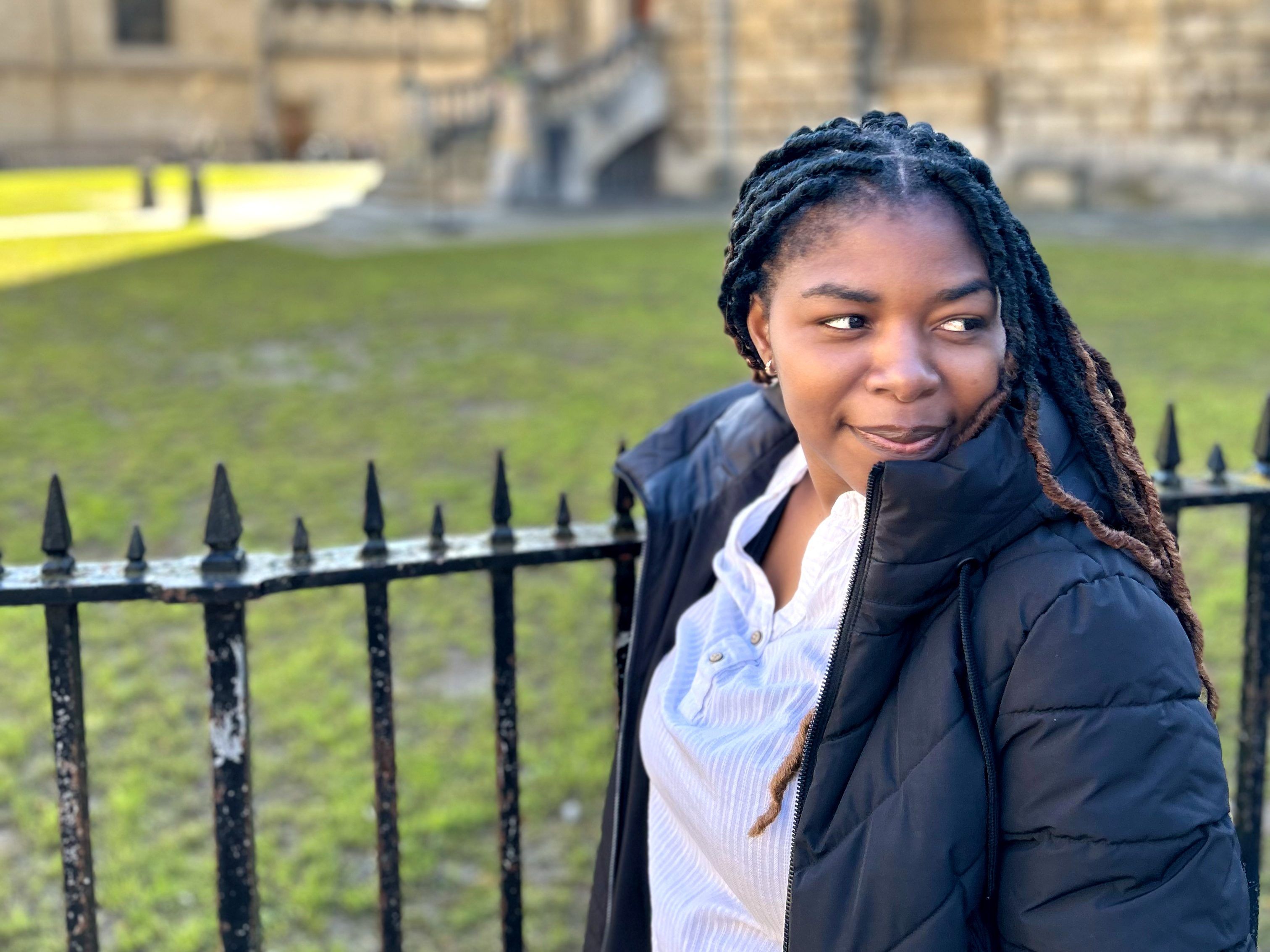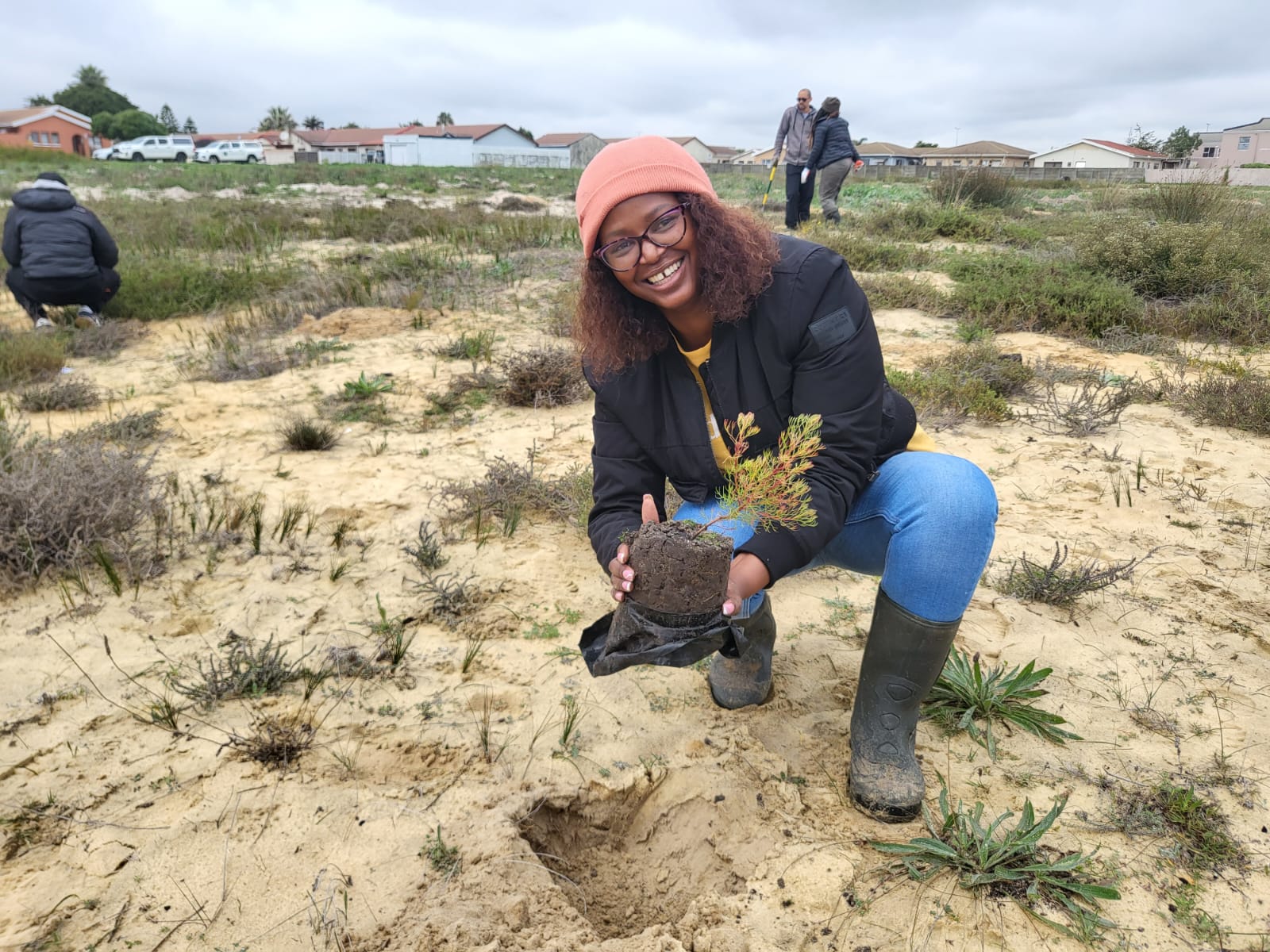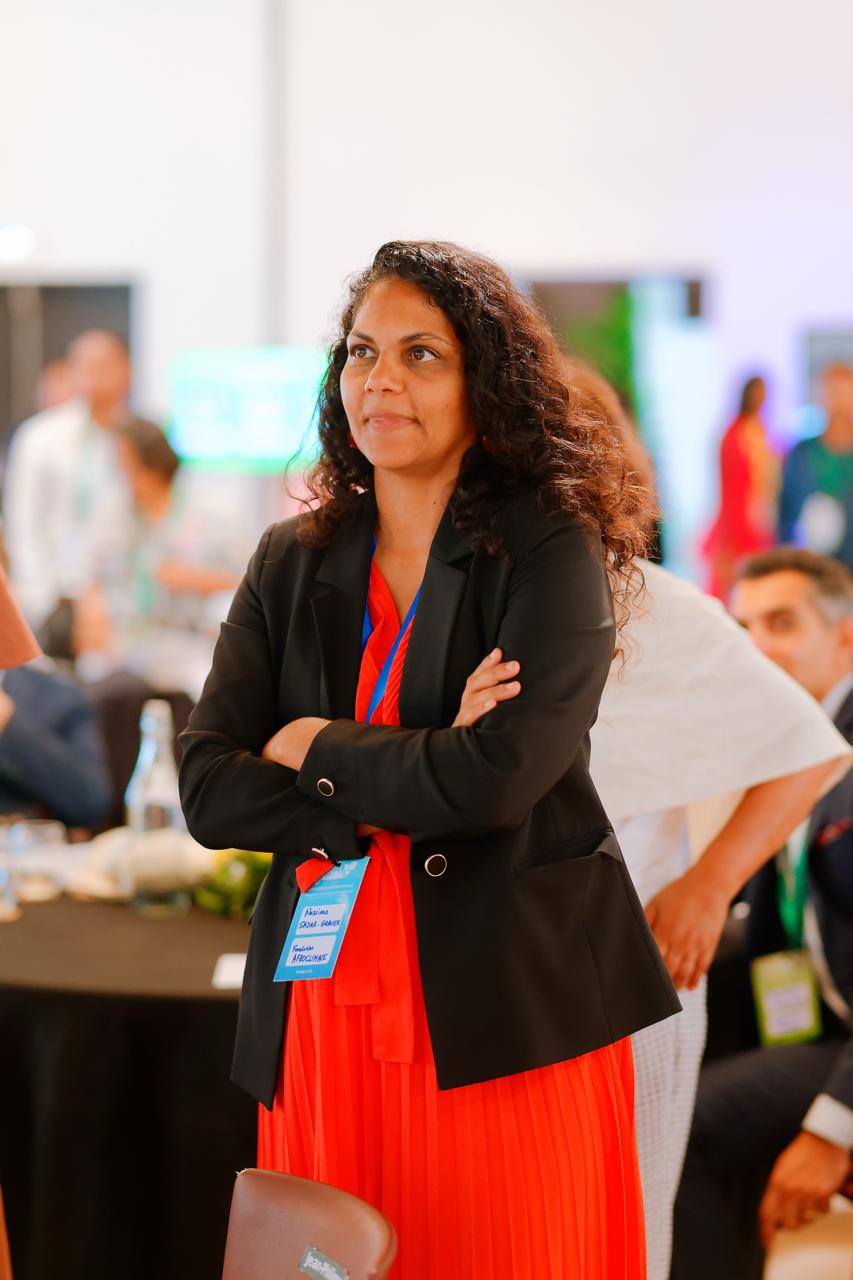The differences we see between people help us put things in these "neat" little boxes where everything belongs. It's our way of making sense of what is unfamiliar.
Malawian-born Lessah Mandoloma's life has been shaped by an unconventional matrilineal heritage, where women wield significant power and influence. For most of her adult life, she grappled with societal stereotypes that often clashed with this cultural legacy. However, within this clash emerged a subtle strength—a passion for uniting diverse perspectives for the betterment of communities and the environment. Her narrative champions a world founded on unity and understanding.
In her DPhil/PhD research project at Oxford University, she uses interdisciplinary approaches to address how food systems and production can be changed to meet the needs of the growing human population and how biodiversity goals can be achieved without compromising people's food security.
Alongside her studies, Lessah serves as an African Universities Ambassador, mentoring prospective African students and fostering research collaboration between Oxford and African institutions.
In this conversation with Damaris Agweyu, the WE Africa 2023 fellow introspects on a journey that led her to reclaim her voice in a world that was determined to silence it.

Lessah, what motivates you to show up every day?
The need to drive positive impact. If it involves contributing to making the world a better place, then sign me up.
What does a better world look like for you?
I understand that diversity is essential. However, most people get caught up in our differences and forget our similarities. And this is something we learn along the way. Because when we were kids, there was no such thing as black or white, rich or poor. We assimilated these things. And as we grew older, we put a lot of focus on them.
Yes, privilege exists at so many levels. But is that all that you're going to see? Why does it have to come down to us versus them?
Sure, we want different things and see things differently. But at our core, this fundamental desire for the good of humanity unites us all. And so, for me, a better world is one where we focus less on what sets us apart and more on what brings us together.
Why do you think we tend to focus on what makes us different?
I think it comes down to the need to control. And the differences we see between people help us put things in these "neat" little boxes where everything belongs. It's our way of making sense of what is unfamiliar.
I've experienced this at a very fundamental level. I come from this clan in Malawi with strong, outspoken women. It's a matrilineal lineage where property, like land, is passed down through the women in the family. So, traditionally, especially in rural areas, after marriage, the man was supposed to settle down in the woman’s village. In this case, men have rights to use the land, but the authority to govern and transfer the rights rests with the women. It's a form of empowerment that comes at a very young age. But this comes with challenges because it's a very small clan with a very unconventional way of doing things. And so, the system is highly criticised.
I remember at a young age, I used to have a certain courage and voice. As I grew up, I found myself constantly justifying who I was. People would point out how opinionated I was. Statistics on the divorce rates from my clan did not help at all. But instead of digging into the reasons why this was the case, people blamed it on the clan’s traditions. Explaining why I was the way I was and where I came from was exhausting, so I just retreated.
Have you reclaimed your outspoken self?
It depends on the context. So, I will be outspoken within the spaces where I feel safe. For example, in my family, it's not even a question. But in the conventional world, I wear this armour so I don't have to keep justifying myself to those who don't understand me.
Having said that, I am very grounded in who I am. And when something intrinsically disturbs my core or threatens my values, I am very outspoken. WE Africa showed up at the perfect time because, through this journey, I've come to accept the Lessah that I'd hidden away for so long.
Did you choose your career, or did it choose you?
It just unfolded. One thing I was sure of was that I wanted to carve my own path. Most of my family's women have chosen careers involving numbers and spreadsheets. I didn't want to follow a similar path. Currently, I do deal with numbers when I am analysing my data, but I guess it’s different.
I remember my late older brother telling me, "If you want a Monday to Friday, 9 to 5, go to one of these universities. If not, then you need to be at the University of Agriculture.” The choice was obvious. And then the question became: What do I study at the University of Agriculture? The answer came when I started taking classes in wildlife conservation, habitat ecology and eco-tourism. I was all in. I quickly followed this up with a Master's in Natural Resources Management and started teaching conservation courses.
Fieldwork was the game-changer. Going into protected areas, talking to communities, understanding their conflicts with wildlife—something clicked. It felt like I belonged there.
Now that you’ve gone on to pursue your PhD, are you leaning more towards academia or conservation practice?
Back in Malawi, academia provided the sweet spot. One day, I'd be out consulting; the next, I'd be in the classroom teaching. What was great was that every day wasn't a copy-paste of the one before. Teaching, which was the original plan, has definitely been rewarding. But today, I honestly don't know the answer to this question. This whole PhD and WE Africa journey has provided new perspectives. If there’s one thing I know now, it's being intentional and doing things according to my why, which I am still figuring out!
How has your experience been balancing a PhD with a young child, considering the challenges many women face in similar situations?
Not easy. Incidentally, I got the news that I was pregnant at the same time that I secured my place at Oxford University. I was supposed to be in Oxford in October 2019, and my EDD was on the 5th of September. I had a lot of mixed emotions. I didn’t want to feel like I had to choose either! But that's also when I realised I wanted to be a mum. I almost missed my place at Oxford, but my supervisor gave me the support I needed to secure my spot.
My partner and I landed in the UK with a one-year-old daughter smack in the middle of COVID-19. We were stuck in quarantine in a foreign country for 14 days. That was hard.
Trying to juggle school and family felt chaotic, and I started taking things the wrong way. I remember walking into a room and being asked, "How did you get here?" I couldn't figure out why I was being asked this. I started questioning if I even deserved to be there. That's when a friend mentioned imposter syndrome. I had to Google it to understand what it meant. I discovered it's a common thing, but still, I felt isolated. And it wasn't just about being from Malawi or being black; it was also because I was a student and had a young child.
These circumstances made it a difficult place to be, but I'm grateful because I had an amazing support system. I'd call my mum, who always encouraged and cheered me up. And my supervisor did something that made me uncomfortable, but in the end, I'm glad she did it. I'd confided in her about my struggles, and with that information, in one of the sessions during our lab meeting, she asked other people to share their experiences about what it felt like when they started. Turns out, I wasn't alone. They had taken months to feel settled, too. Through it all, the most important thing I've learned is to prioritise my well-being, which wasn't something I had given much thought to before.
What rituals do you follow for your well-being?
I used to feel guilty taking breaks or holidays, but that has changed since my We Africa journey. I now intentionally take breaks. But beyond that, I've realised it's okay to say no sometimes. I used to stick to this structured routine, whether it worked or not. But now, if something's not working, I mix things up. So if my brain's not cooperating, I'll go to the cinema midweek. Or rather stay in bed!
And I will ask for help. It's funny how we sometimes build up these big explanations in our heads because of guilt and conditioning. But often, a simple ask or statement works wonders.
I remember having a conversation with my partner about splitting school drop-offs. He'd been with me for the first two and a half years, and I hesitated to ask him for anything because there was this inner and outer pressure to be grateful to him for adjusting his life for me. Suddenly, I was hesitant to ask for more. But I really needed help. So I gave him this whole rehearsed speech about dividing the week for school runs, and you know what? He just said, "Okay." I was surprised but also relieved. And I've learned since that it's okay to ask for what I need. I have learned that no matter how close you are to someone, they can not always guess or know what you want unless you tell them.
What's the biggest lesson you've learned over the last year?
That it's okay for me to be my authentic self and own her. This lesson came when I was at this crossroads in my life. I'd been appointed as the African universities ambassador for my department, where my role would be to mentor prospective and sometimes current African students in my department. At this time, I was still questioning my place, and this only fueled my imposter syndrome. The pressure I put on myself to not make a mistake for fear of reflecting poorly on an entire group was overwhelming.
But then, my coach introduced me to the concept of reframing things. When I would concentrate on discounting myself, she would ask me, yes, that is true, but what else is there? What about the other way? She challenged me to see that diversity chair as an opportunity. And that changed everything. I stopped carrying the burden of representing an entire continent and started advocating for what I believed was right. And that's when I realised that beyond any title or label, my voice mattered.
***
This interview is part of a series profiling the stories of the 2023 WE Africa leadership programme fellows, African women in the environmental conservation sector who are showing up with a strong back, soft front, and wild heart.




